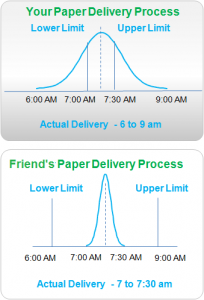What is Six in Six Sigma?
This is the second article in the series that will help understand ‘What is Six in Six Sigma?‘ If you haven’t already read our article ‘What is Sigma in Six Sigma‘, we would like to recommend that you first do so. For now, let’s look into what is Six in Six Sigma. Let’s get started by understanding Customer Requirement and Actual Performance. We are going to use the example of newspaper delivery everyday to your house. As a customer, you want newspapers to be delivered between 7:00 and 7:30 am (say within a half hour window). However, in reality, the paper gets delivered only between 6:00 to 9:00 am (a 3 hour window). So, in this case, the customer requirement or allowable variation is ’30 mins’ while the Actual Performance or Actual Variation is 3 hours. On the contrary, your friend isn’t so particular about his newspaper delivery. He is in fact fine if they are delivered between 6:00 to 9:00 am (a 3 hour window). But in reality, his papers get delivered between 7:00 to 7:30 am (a half hour window). How would you characterize these two situations?
- In your case, actual variation is much higher than allowable customer requirement. In other words, Standard Deviation or Sigma is high.
- In your friend’s case, actual variation is much lower than allowable customer requirement (and so, Standard Deviation or Sigma is low)
Now, let’s answer the question ‘What is Six in Six Sigma?’ Six refers to the Sigma Capability of any process. In this case, the newspaper delivery process. When it’s Six, it means that the Standard Deviation or Sigma is so small that 6 Standard Deviations or 6 Sigmas can be fitted on either side of the bell-shaped curve. Based on the principle of bell-shaped curve (normal curve), 6 Sigma equals only 3.4 defects per million opportunities. For the newspaper example, it means that if there are 1 million days of newspaper delivery, only on 3.4 days (i.e. 3 or 4 days) of the delivery will be beyond your requirement. So, it is very obvious that your newspaper delivery isn’t at the Six Sigma level, but your friend’s delivery could be. It depends on the value of Standard Deviation. We covered the computation of standard deviation in ‘What is Sigma in Six Sigma’.
Let’s say for your friend’s process, only 5 standard deviations or sigmas can be fitted on either side of the bell-shaped curve, then, his sigma capability is at 5 or his newspaper delivery process is at 5 Sigma. To sum up, if you want a particular process to be at Six Sigma, then you will have to manage the following: Understand what the customer requirement is? If there is a window within which the customer wants her delivery or quality, then that becomes your customer requirement.
- Use the data of process performance to compute the standard deviation.
- Assess if the Standard Deviation or Sigma of the process is small enough, that 6 Sigmas can be fitted on either side of the customer requirement window.
- Let’s say your process isn’t at Six Sigma then to find out the sigma value you can either use Sigma Capability Table, Normal Distribution Table or Sigma Calculator. Details of how to compute Sigma for any process is covered in detail in our Six Sigma Green Belt Course.

